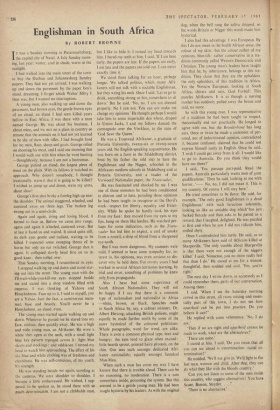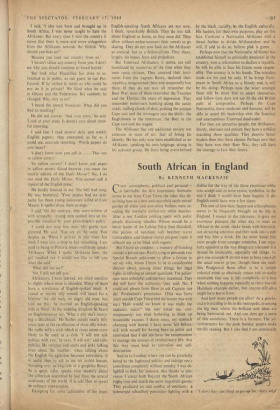Englishman in South Africa
By ROBERT BROWNE
IT was a Sunday morning in Pietermaritzburg, the capital city of Natal. A July Sunday morn- ing, last year; winter; cool in shade, warm in the sunlight.
I had walked into the main street of the town to buy the Durban and Johannesburg Sunday papers. They had not yet arrived. I was walking up and down the pavement by the paper boy's stand, dreaming. I forget which Walter Mitty I, then was, but I wanted no interruption.
A young man, also walking up and down the pavement, had brown eyes, the gentle brown eyes of an eland, an eland I had seen killed years before in East Africa. I was there with a man named George. He was about his business, I about miner and we met on a plain in country so remote that the animals on it had not yet learned to be shy of men with rifles. I had brought food for my men, flour, sheep and goats. George relied on shooting.his meat, and I said one morning that I would walk out with him when he went hunting —thoughtlessly, because I am not a huntsman.
George picked an eland, the largest piece of meat on the plain. With its fellows it watched us approach. Why doesn't somebody, I thought irrationally, warn it that it is going to be killed? I wished to jump up and down, wave my arms, shout shoo!
George's first shot broke a foreleg high up near the shoulder. The animal staggered, wheeled, and cantered away on three legs. The broken leg swung out in a semi-circle.
Again and again, tiring and losing blood, it turned to face us. Before we came into range, again and again it .wheeled, cantered away. But at last it faced us and waited. It stood quite still, its dark eyes gentle and radiant, waiting to be killed. I expected some sweeping threat of its horns but only an ear twitched. George shot it again. It collapsed slowly head first on to its good knee: then rolled over.
That Sunday morning, I remembered its eyes. I stopped walking up and down and stood star- ing out into the street. The young man with the - I'll-wait-while-you-kill-me eyes stopped beside me and stared into a shop window filled with cameras. I was thinking of Yahoos and Houyhnhnms. Face up to it, I said to myself, you are a Yahoo, face the fact, a carnivorous mam- mal, base and .beastly. You'll never be a Houyhnhnm. an eland, even.
The young man started again walking up and down. Whenever he passed me he stared into my face, curious, then quickly away. He was a high and wide young man, an ,Afrikaner. He wore a white shirt open at the neck, with a small light blue key pattern repea,ted across it : light blue shorts and stockings: and veldskoen. I turned my head to watch him approaching. The effect of his sky blue and white clothing was of freshness and cleanliness. He was self-conscious, of his youth, hi. strength.
He was standing beside me again, scowling at the cameras. We were shoulder to shoulder. I became a little embarrassed. He wished, I sup- posed, to be spoken to, he stood there with so much determination. I am not a clubbable man, but I like to hide it. I turned my head towards him. I bared my teeth at him. I said, 'If I am here early, the papers are late. If the papers are early, I am late and the papers are sold out. I can never exactly time it.'
We stood there talking for an hour, perhaps longer. We talked politics, which many Afri- kaners will not talk with a sociable Englishman, lest they wring his neck. Once I said, 'Let us go to drink, something strong or hot, somewhere to sit down.' But he said, `No, no. I am not dressed properly. No I can not. Ydu can not make me change my opinions.' He thought perhaps I would take him to some imperialist den where, draped in Union Jacks, I and my fellows danced the carmagnole over the Vierkleur, to the tune of 'God Save the Queen.'
He was a Transvaal Afrikaner, a graduate of Pretoria University, twenty-six or twenty-seven years old. No English-speaking acquaintance. He was born on a farm in the Middelburg district, bred by his father (he told me) to hate the Englishman and the Nigger, schooled in the Afrikaans medium schools in Middelburg and at Pretoria University, and a reader of the Verwoerd Nationalist paper, the Tratuvaaler.
He was fascinated and shocked by me. I was one of those monsters he had been conditioned to distrust and to hate, parading those opinions he had been taught to recognise as the Devil's work—respect for liberty, equality and frater- nity. While he spoke he hardly took his eyes from my face: they moved from my eyes to my lips, hung on them like leeches. He watched per- haps for some indication, such as the Trans- vaaler has led him to expect, a curl of smoke from a nostril, a drop of blood from a sharpened eye-tooth.
But I was more dangerous. My manners were mild. I seemed to have sonic sympathy for, in- terest in, his opinions, was even anxious to dis- cover why he held them. For twenty years I had worked in several African territories learning, by trial and error, something of problems he knew onlyfrom propaganda.
Also I have had some experience of South African Nationalists. They will not be happy if I say that there is a common type of nationalism and nationalist in Africa —white, brown, or black. Speeches made in South Africa by, say, a cabinet minister, Dr. Albert Hertzog, attacking British policies, might equally be made further north by some of the more hysterical of the coloured politicians. Whole paragraphs, word for word, are alike. There is even a common physical type, lean and hungry: the eyes tend to glaze when excited: little beards sprOut, pointed hairy protests, on the chin. One sees such amongst dedicated Afri- kaner nationalists; equally amongst fanatical Mau-Mau.
When such a man has come my way I have known that there is trouble ahead. There can be no reasoning, no moderation. There is a sore somewhere inside, poisoning the system. But this seemed to be a gentle young man. He had been taught hysteria by his leaders. As with the original dog, when the bell rang the saliva dripped, so the words Britain or Nigger (his word) made him hysterical.
I also had this advantage. I was European. By this I do not, mean in the South African sense, the colour of my skin : but the colour rather of my opinions, blue-ish: rather conservative in a tra- dition commonly called Western Democratic and Christian. The young man's leaders have taught him that he, by inheritance, belongs to this tra- dition. They claim that they are the upholders. the only upholders, of this tradition in Africa. Yet the Western European. looking at South Africa, shivers and says, God Forbid! This puzzles Afrikaners. It is as though a nursing mother has suddenly pulled away the breast and said, no more.
So with this young man. I was representative of a tradition he had been taught to respect, theoretically and not practically. He longed to agree with me, but the Broederbond has long ears. Once or twice he made a statement of per- sonal, not of indoctrinated opinion, contradicted it, became confused; claimed that he could not express himself justly in English. Once he said, 'I wish I could get away from it all. I would like to go to Australia. Do you think they would have me there?'
I said, 'Yes, passage part-paid. Read the papers. Australia particularly wants men of your qualifications.' Then he said, looking at me with horror, No, no, I did not mean it. This is my country. Of course I will stay here.'
He tried sometimes to be fierce. He said, for example, 'The only good Englishman is a dead Englishman,' with such ferocious solemnity, looking so like an amiable dog which has just barked fiercely and then asks to be patted as a reward, that I laughed, delighted. He was puzzled at first and when he saw I did not ridicule him, smiled shyly.
Once I contradicted him tartly. He said, as so many Afrikaners have said of Africans killed at Sharpeville, 'The only trouble about Sharpeville is that there were not enough of the niggets killed.' I said, 'Nonsense, you no more really feel that than I do.' He stared at me for a minute, thoughtful, then nodded and said. 'Yes, you're right.'
The next day I wrote down, as accurately as I could remember them, parts of our conversation. Among them: I said, 'When I see the Saturday morning crowd in this street, all races mixing and essen- tially part of this town, 1 do not see how apartheid can be put into practice. Do you believe it can?'
He replied with some vehemence. 'No, I do not.'
'Then if we are right and apartheid cannot be made to work, what arc the alternatives?'
'There are none.'
I stared at him. I said, 'Do you mean that all you can see ahead is extermination—racial ex- termination?'
He nodded. 'We'll not give in. We'll fight to the last man, woman and child. After that, they can do what they like with the bloody country.'
'Can you not listen to some of the men inside this country, who suggest alternatives? You have Sauer, Basson, Steytler. . .
'There is no alternative.'
A Great Newspaper Event
At last
Field-Marshal
ALEXANDER
Tells His Story For 1 5 ■ cars, Field-Marshal Earl Alexander of Tunis has been pressed to tell his story of the War. Until now he has kept silent and • aloof from the fierce controversies arising from the memoirs of the great Allied com- manders. Now he has decided to allow his testi- mony to go on record. And to The Sunday Times EXCLUSILYE Starting this Sunday hie
SUNDAY TIMES
ONE OF THE WORLD'S GREAT NEWSPAPERS conscious of an army of bowler-hatted men with their heels dug firmly in, determined that as things have been so they shall continue, looking with infinite distrust at new ideas, new accents, throwing up barricades around the bits of the national life that they still hold. They are losing, I suppose. But their dragging effect is very apparent to anyone from a less old and rigid society. In among the wonderful new schools one stumbles upon a corpse, like the English Electric building in the Aldwych. The maggots drop out of the personal column : 'Peer required for board of progressive hire purchase company. . . ."Ex- public schoolboy. 45, seeks employment. . .
There are so many different overlapping Britains that one can virtually mount any generalisation one chooses. 1 am a sucker for the unabashed British sentimentality, a fan of Fenner Brockway, Andy Pandy, Yorkshire accents, John Betjeman and the civil servants who feed the ducks in St. James's Park. On the other hand, it is disturbing to find evidence that traditional British cruelty to children is surviving the onslaught of the Spock and Freud brigades, that one-year-olds are pot-trained, three-year-olds are well man- nered and eight-year-olds are dispatched to Siberian boarding schools.



































 Previous page
Previous page